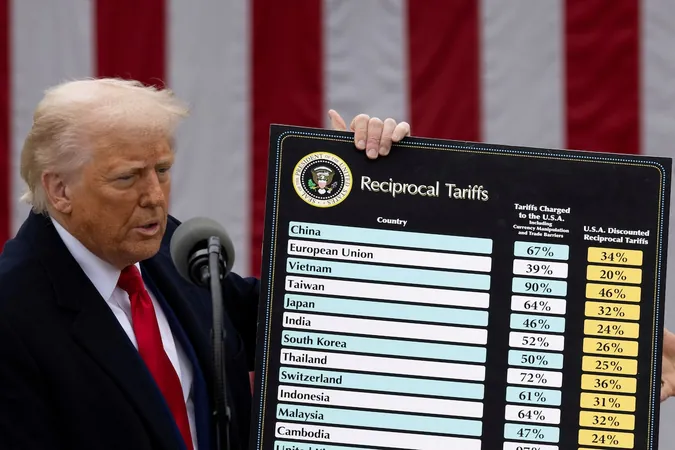
Trump’s Tariff Strategy: Are We On the Brink of Economic War?
2025-04-07
Author: Noah
Cracks are beginning to show in the foundation of Trump's policies, particularly as his administration's handling of tariffs threatens to provoke a backlash both domestically and internationally. Texas Republican Ted Cruz recently voiced concerns that the GOP could face a significant setback in the 2026 midterm elections if Trump’s proposed “Liberation Day” tariffs lead the economy towards a recession — a fear that is becoming increasingly plausible as billions are lost in U.S. stock markets.
Notably, billionaire investor Bill Ackman, usually a supporter of Trump, characterized the situation as an “economic nuclear war.” His comments suggest that these policies could seriously undermine business confidence and tarnish the nation's reputation while further distorting consumer sentiment.
This past weekend witnessed a wave of activism, with over a thousand “Hands Off” protests occurring across the nation, reflecting growing opposition to the tariffs. Even Elon Musk, a long-time ally, expressed his discontent on social media, criticizing Trump’s trade advisor, Peter Navarro, and advocating for zero tariffs between the United States and the European Union.
In response to the mounting criticism and unrest, Trump showed little interest in changing course, even taking time out to play golf. His stance remains firm: he refers to the tariffs as “a beautiful thing to behold,” claiming they are the solution to what he describes as “massive” trade deficits with major economies including the EU and China, despite the significant downturn across various markets.
Now may be the pivotal moment for opponents of these tariffs to band together and counter Trump's aggressive strategy. While anti-tariff movements are gaining momentum domestically, they have yet to inspire a cohesive response from foreign governments. Many of the U.S.'s largest trading partners, including the UK, India, Japan, and Australia, have opted for restraint in their reactions to Trump's policies, a stark contrast to China's hefty tariffs of up to 34% on American goods.
On Monday, the European Union responded to the threat of tariffs by reconsidering retaliatory measures against American products, notably bourbon, fearing Trump’s potential 200% tariffs on EU wines and spirits. European Commission President Ursula von der Leyen articulated the EU's desire for a “zero-for-zero” tariff arrangement but maintains a readiness to impose retaliatory tariffs if needed.
The current strategy from foreign nations appears puzzling, especially given the detrimental impact of Trump's tariffs, which range significantly from 3.7% on Japan to a staggering 17% on India. In contrast, Trump's reciprocal tariffs on these nations are dramatically higher, sometimes exceeding 40%. Economists, including Andrew Sentance from the Bank of England, criticize the lack of true reciprocity in these tariffs.
The reluctance of these countries to act decisively may stem from a belief that cooperating with Trump will yield better trade conditions. However, this underestimation of the U.S.’s leverage could lead to unfavorable agreements that compromise critical issues like food safety regulations, taxation of digital platforms, and military procurement practices.
To effectively challenge Trump, the coalition of hesitant allies must transform into a united front, emulating China's assertive approach by instituting reciprocal tariffs that could overwhelmingly impact the U.S. economy. Goldman Sachs recently raised the chances of a U.S. recession within the next year to 45%, underscoring the seriousness of the situation. An escalation in tariffs could drive the nation into economic turmoil, validating Cruz's warnings.
Moreover, there’s the potential for these trading partners to forge exclusive trade agreements among themselves — for instance, between Canada and the EU, or Commonwealth nations like India and the UK.
Trump's political acumen recognizes strength and resolve when he sees it. Right now, he is leveraging the discord among his trading partners to instate tariffs unchecked. Only by presenting a united stance can this trend be challenged effectively. Should retaliatory actions lead the U.S. into recession, the warning signals highlighted by Cruz could turn out to be profound, as Trump seeks to navigate the political landscape in a way that avoids alienating voters ahead of the next election.









 Brasil (PT)
Brasil (PT)
 Canada (EN)
Canada (EN)
 Chile (ES)
Chile (ES)
 Česko (CS)
Česko (CS)
 대한민국 (KO)
대한민국 (KO)
 España (ES)
España (ES)
 France (FR)
France (FR)
 Hong Kong (EN)
Hong Kong (EN)
 Italia (IT)
Italia (IT)
 日本 (JA)
日本 (JA)
 Magyarország (HU)
Magyarország (HU)
 Norge (NO)
Norge (NO)
 Polska (PL)
Polska (PL)
 Schweiz (DE)
Schweiz (DE)
 Singapore (EN)
Singapore (EN)
 Sverige (SV)
Sverige (SV)
 Suomi (FI)
Suomi (FI)
 Türkiye (TR)
Türkiye (TR)
 الإمارات العربية المتحدة (AR)
الإمارات العربية المتحدة (AR)